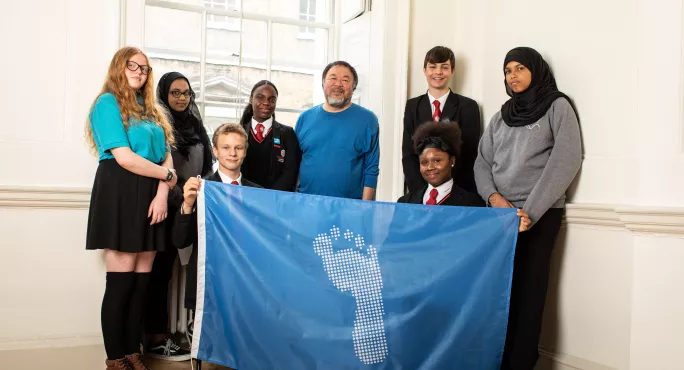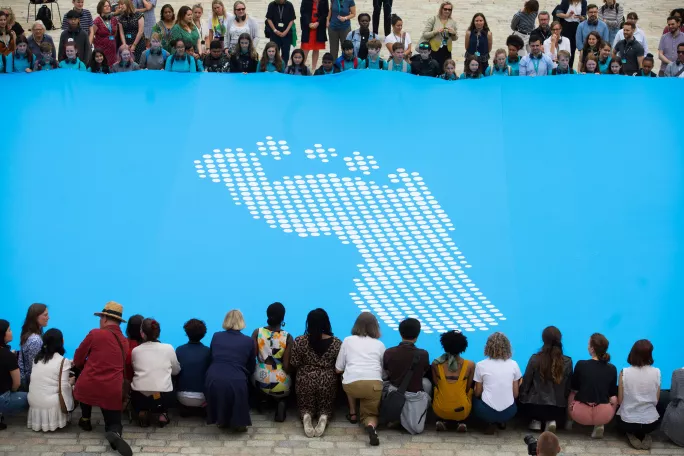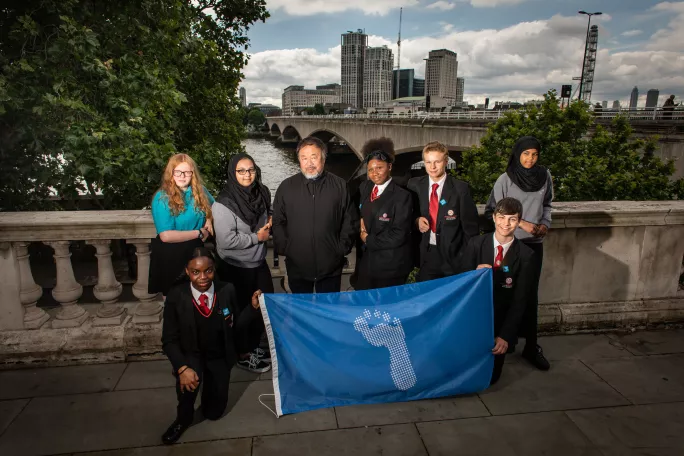- Home
- Profile: Ai Weiwei on why Western education is ‘lazy’
Profile: Ai Weiwei on why Western education is ‘lazy’

Ai Weiwei is not known for understatement.
The conceptual artist and political dissident famously photographed himself dropping a 2000-year-old Han dynasty urn. In another work, he is pictured jumping naked - except for a strategically placed toy horse - while a caption directs profane abuse at the Chinese Communist Party.
When it comes to his art, retiring he is not.
In person, though, it’s a different story. Shuffling into the interview room, bearded and in a plain blue T-shirt, he’s an unassuming presence - shy, even.
He speaks quietly and carefully. But despite the apparent diffidence, his thoughts about education are closer to the boldness of his art.
The subject has acquired a particular relevance for Ai - he currently lives in Berlin, but is reportedly thinking about splitting his time between Germany and the UK, and sending his 10-year-old son to a school in London.
Read: Schools urged to fly new human rights flag by Ai Weiwei
International: Teachers are ‘single greatest obstacle’ to populism
Pedagogy: England ‘wrong to copy Shanghai maths’
Ai has been visiting schools in the capital, but Tes has been given the opportunity to talk to him about something different. To mark the 70th anniversary of the Universal Declaration of Human Rights, he was commissioned by UK arts and human rights groups to create a new flag, which schools are being encouraged to fly.
“The human rights concept has been here for over 70 years, and still we have to renew it at every moment,” he says.
Human rights aren’t an abstract concept for Ai. A vocal critic of the Chinese government, he was detained in a secret location for 81 days in 2011, and has also spent time under house arrest.
Political persecution runs in his family. His father, Ai Qing, was one of China’s most celebrated poets. During the Cultural Revolution the entire family, including the young Weiwei, was sent to a labour camp in the country’s far north-east.

Human rights have a particular resonance to someone who has felt the brunt of unbridled state power. But Ai warns that we shouldn’t be complacent in the West. He believes that teachers have a special responsibility to educate young people about the importance of these hard-won rights.
“In many nations and cultures, the populist or the nationalist moment is quite strong,” he says.
“Very often, it hurts the human rights condition, so that’s why we think we have to have better education in school to make children understand that today’s prosperity and rights are not given for free.”
In the 1980s, Ai was in the first generation of Chinese artists to study in the US. He has lived in political exile in Berlin since 2015, and his art takes him around the world, so he has a rare perspective on approaches to education in the East and West.
He is disappointed to hear reports that art is being squeezed out of schools in England, but not entirely surprised.
“Society can have a tendency to put rationality and efficiency above humanity and humans’ inner spiritual need,” he says. “That is tragic for education because life is given by a miracle and with a meaning that is not just to serve some purpose, but rather to discover who we are and to appreciate a possibility which is not exactly proven as a rational purpose.
“If we don’t appreciate the mysterious part, the unspeakable possibilities, we are not understanding life itself.
“Whatever the society may achieve will be meaningless because it doesn’t really help us to reflect on individuality, personal freedom or the health of our emotions and imagination and creativity.
“So when those things are being taken away or restricted, how can we imagine that society can still be called a civilised society?”

With East Asian nations dominating international league tables, emulating Chinese approaches to education has become close to an article of faith in the Department for Education. The government has so far invested £76 million into its Shanghai mathematics programme alone.
While Ai admits he is no pedagogy expert, he is scathing about certain aspects of contemporary Chinese education.
“Of course China has a strong tradition in teaching and learning,” he says.
“But today when we talk about China it is under Communist control which cannot necessarily even be called a Chinese style of teaching - it’s just Communist control of education.
“A lot of learning is ravaged because it is censored and imbalanced education - brainwashed.”
Much of it revolves around “trying to memorise, rather than understand”, he says, and “creativity and imagination are not encouraged in school in China”.
Of course, the educational exchange between East and West is not one way. DfE ministers might fly to China to observe Shanghai maths, but the Chinese elite are also increasingly sending their offspring to be educated in the West, and particularly in Britain. Chinese pupils make up the largest number of foreign students in British private schools according to this year’s Independent Schools Council census, and Chinese investors are even swooping to buy struggling schools.
While Ai is mulling sending his son to a London school, he thinks the Chinese political elite muscling its way into the British education system is a “very unhealthy development”. He’s not convinced by those who say that the increasing movement of Chinese students around the world will liberalise the country.
The Chinese elite don’t send their children to the West because they “love education”, he says. “They understand education is important, they understand that is a powerful way to win the [global] competition…They also want to prove they come to the most valuable assets of the West - establishment education.”
Asked about his own schooling, Ai says he is a “perfect example of an individual never being systematically educated - everything I did was against the school”. He holds a guest professorship in Berlin, but says it’s a “nightmare” (“I’m kinda physically allergic to a campus”).
While Ai might kick against authority and criticise the Chinese education system, the country’s famous work ethic seems to have left a mark on him. He seems astonished by the indolence and lack of structure he has seen in Western education. “They call it liberal; I call it lazy,” he jokes. His son’s German schooling has been “basically play-oriented or game-oriented,” he says. “I think that can also be a problem, because the mind, at a young age, is the most precious moment.”
“My son never had homework. That’s unthinkable. It’s so apart from China because in Chinese school you would have homework ‘til the moment they have to go to sleep.”
This is “very heavy”, he admits, but it gets results. “It’s amazing: a schoolchild of four years old can read newspapers, can reflect on so many things. The capacity of the human mind, you cannot underestimate. Here it’s just too casual. Land of gold!”
While he might be a bohemian and subversive modern artist, if you were to pigeonhole him into our own educational vernacular, Ai comes across as a bit of a traditionalist (notwithstanding his criticism of rote-learning).
He thinks learning comes after a series of hard knocks, and when he gets onto the subject of how young people can’t google their way to understanding, you get the sense Michael Gove would heartily approve.
“[Students of today] think they are so equipped with all the information - it’s so easy, any knowledge is just a finger-touch away.
“But true knowledge is not like that, right? It’s just information - you have a way to find the information but it doesn’t come to you.
“Knowledge requires you make effort to make mistakes, and the learning from those mistakes. You have to be a failure to be a success in your life. It takes a long time.
“If a school is trying to encourage every student to say they don’t have to fail, that’s a lie - the biggest lie in Western education, I should say.”
CV: Ai Weiwei
1958: Ai and his family are exiled, first to Heilongjiang in northeastern China, then soon after to the deserts of Xinjiang, in northwestern China
1978: Enrolled in the Beijing Film Academy, co-founder of the Stars group of avant-garde artists
1981-1993: Lived in the United States, briefly studying at Parsons School of Design, New York City
2008: Collaborated with Herzog & de Meuron on the Beijing National Stadium (the “Bird’s Nest”) for the Olympics
2010: Covered the floor of the Turbine Hall at Tate Modern with 100 million porcelain sunflower seeds
2011: Detained for 81 days by the Chinese authorities
2012: Awarded the Václav Havel Prize for Creative Dissent by the Human Rights Foundation
2015: Awarded Ambassador of Conscience Award by Amnesty International
2017: Ai’s film Human Flow on human migration participated in the 74th Venice International Film Festival
Keep reading for just £1 per month
You've reached your limit of free articles this month. Subscribe for £1 per month for three months and get:
- Unlimited access to all Tes magazine content
- Exclusive subscriber-only stories
- Award-winning email newsletters



